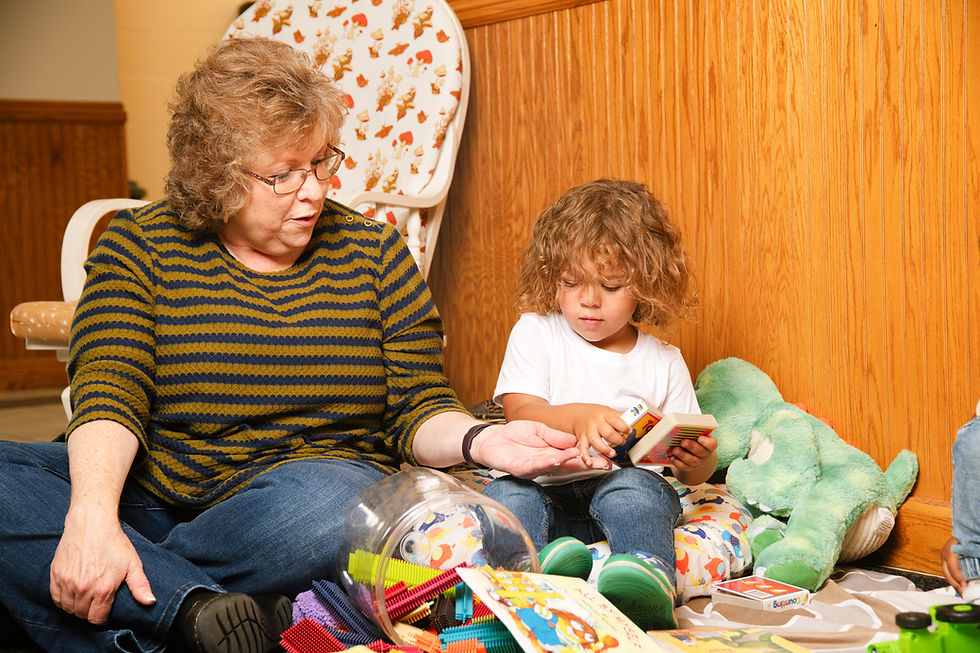FIVE COMMON QUESTIONS FROM FIRST-TIME PARENTS
- childandfamilyreso
- Dec 4, 2023
- 4 min read
Updated: Jun 21, 2024

If you’re expecting your first baby – congratulations! Whether you are pregnant, completing an adoption or fostering a newborn, being a first-time parent can feel exciting, overwhelming, emotional and even scary. All of these feelings (and more!) are completely normal. You’re preparing to take care of and nurture a small human being — it’s a big responsibility!
Babies don’t arrive with a set of specific instructions, so knowing what to expect can be challenging. We have listed five common questions we hear from first-time parents.
1. Does holding my baby too much spoil him?
Absolutely not. In fact, giving newborn babies positive attention by holding and snuggling them, talking or singing to them calmly and helping them when they appear to be in need of something (food, diaper changes, comfort) is very important. Newborns learn to feel secure and safe when they are near loved ones. Additionally, babies' brains are continuing to grow after they are born, so giving them attention, love and comfort helps their brains to make important connections for health, learning, behavior and overall well-being.
2. Does leaving my baby alone when she cries help her learn to self-soothe? No. Studies have shown that human beings develop important skills through relationships, not in isolation. Infant brains are not developed enough to figure out how to make themselves feel better, so it is important to offer comfort and help soothe them when they are fussy or crying. When a baby gets upset, and you respond to provide help and comfort, they begin to understand that you are a source of calming comfort and a trusting relationship begins to form.
3. How often do I feed my baby? Newborn babies have very small stomachs, so they start off by drinking small amounts of milk or formula more often. It’s generally recommended that newborns eat on demand, not on a schedule. Whether your baby is breast or bottle fed, it’s best to feed them when they show signs of hunger, such as crying, making sucking sounds, or trying to suck on their fingers or hand. As always, we recommend discussing how often your baby should eat (and any other questions) with their pediatrician.
If you breastfeed, it’s not easy to know how much milk your baby has consumed. For the most part, they will feed until they are full and will act satisfied and often sleepy. Babies receiving enough breastmilk will have several (approximately six) wet diapers and several bowel movements throughout the day. They will also steadily gain weight.
If you are bottle or formula feeding, you will be able to track how many ounces your baby drinks in a day and can talk to your child’s pediatrician about any concerns.
4. When will my baby sleep through the night? All babies are different, and so are their sleeping habits. While it may seem like it’s all a newborn does, sleeping is incredibly important to their brain growth and development. Additionally, newborns don’t know the difference between day and night, and it takes time for them to develop a sleep pattern. Most newborns sleep about 2-4 hours at a time and typically need to eat throughout the night. By about three months, many babies will be sleeping for longer stretches — many even throughout the night (6-8 hours.) However, just like adults, babies may need different amounts of sleep and food, and some babies may not sleep longer stretches for several more months. Hang in there, they will gradually sleep for longer periods of time — and in the meantime, try to nap during the day when your baby naps!
5. I am stressed out all the time and feel completely overwhelmed. What am I doing wrong?
We can confidently say that you are most likely doing absolutely nothing wrong. Being a new parent definitely adds stress. It is a learning experience that takes time getting used to, and that can feel uncomfortable…but it’s normal! Many new parents experience the “baby blues”, a period of a couple weeks after the baby’s birth when hormones, lack of sleep and adjustments to having a new lifestyle with a baby in the home can cause some sadness, anxiety and/or mood swings.
However, it's really important to know that if you experience deep sadness, anxiety or severe mood swings that does not go away after two weeks, you should talk to a doctor. Prolonged emotional struggles may be caused by postpartum depression. Postpartum depression can actually begin during pregnancy and potentially last long after childbirth (even up to a couple years). It’s also important to know that postpartum depression is not something you have done wrong and isn’t a weakness. In fact, seeking treatment is extremely effective and can help you feel more confident about parenting and make you feel more comfortable bonding with your baby. If you suspect you have postpartum depression, please talk to your doctor, your child’s pediatrician, or contact us so we can connect you with helpful resources.
If you don’t suspect postpartum depression, simply having someone to talk to for parenting advice or encouragement can help you build confidence and feel less overwhelmed. It can be very reassuring to know that others have questioned the same things or have found solutions to problems you may be facing. Reaching out to family members or friends is a great start. At Child and Family Resource Network, we also offer a free “village” of support. We are a network of family support programs that help parents, families and young children with:
New parent support
Child and social development skills
Developmental milestones
Family resources and supplies
Nursing support
If you or your family could benefit from some extra, free support, visit our website and complete a referral form to get connected to a program that’s right for you!




Comments